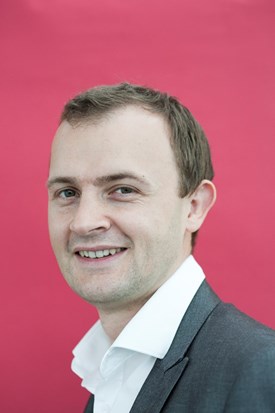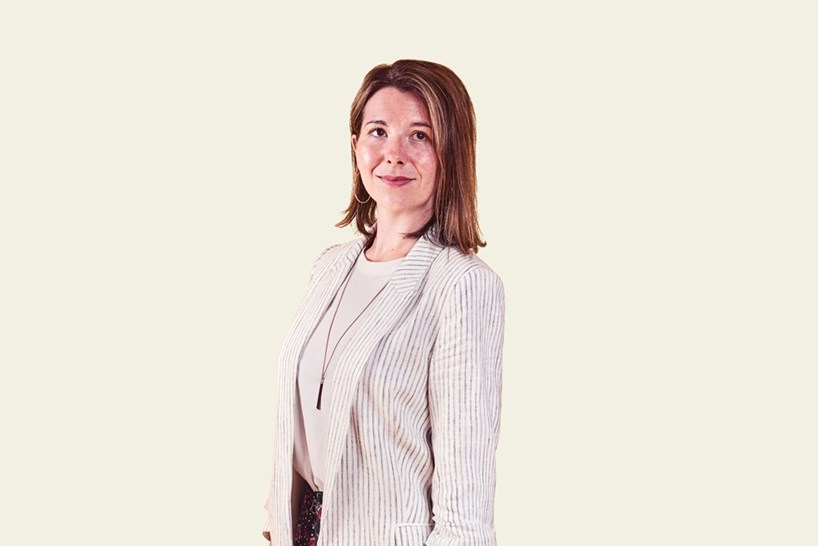FOR years, St Michael-le-Belfrey in York had been patiently fund-raising for a once-in-a-century project to renovate and redevelop their building, only to have the politicians in Westminster pull the rug out from under their feet. A sudden and unexpected change to VAT policy for listed places of worship in early 2025 (News, 25 March) — halfway through the work — left a gaping £1.2-million hole in the Belfrey’s budget.
It meant that the church had to rein back its plans drastically. But, just two days before they had to confirm the much-diminished scheme with their architect, an anonymous donation arrived — of £1.2 million.
 Al ElmesGillian Shepherd
Al ElmesGillian Shepherd
“It was miraculous,” the project’s manager, Gillian Shepherd, says. “It was all just bonkers — to have that was actually a physical relief. Several people were in tears.”
This last-minute donation was actually the second time that an unknown person had given a seven-figure gift towards the church’s building project. The Belfrey team were, of course, enormously grateful, but the largesse also came with challenges, Ms Shepherd says. They questioned whether they were the right recipients; and stewarding it well did feel like a burden. Other churches, which had been “generally very gracious”, might also wonder why the double bounty could not be shared around.
Ms Shepherd now worships at a Belfrey church-plant in the much less affluent city of Hull. She says that that sort of donation would be even more remarkable in her new context.
So, is there a better way to funnel money from wealthy individuals to the grass roots of ministry and mission? Does the Church have the right financial plumbing to unlock the floodgates?
WHEN that question is posed to people working with large sums in the Church, the answer that usually comes back is no. There is money around — passed down in family trusts or from successful businesspeople who want to pay something back. But it’s not easy to get this wealth to those who could best put it to work.
Patrick McDonald, a prolific charity founder and consultant, says that funding in the church world is “currently too random, too expensive, too difficult to find, and too poorly administered”.
This view is shared by Reuben Coulter, an investment adviser who also leads the European arm of Faith Driven Investor, an American movement encouraging Christians to invest for the most impact: “Often, we just kind of sit with money in our bank accounts in savings rather than saying, ‘How might I use this to do things which would really bring God’s flourishing on earth?’”
Stewart (not his real name) is another British figure who, in the gaps in his day job working in high finance, tries to connect up big money with good places to invest it. He agreed that the Church in the UK was not good at getting wealth down to those who could most use it.
There are, at present, no mechanisms to get Christians with an inspired business plan or evangelism strategy and in front of Christians with deep pockets. “There is a whole cadre of people giving away two or three million pounds but who would love to give away 20 or 30 [million],” Mr McDonald says. “But they don’t know where to give it.”
Another challenge is a “scarcity mindset” prevalent across the Church in the UK, as well as embarrassment about money. People are so used to things being pinched and squeezed that this actually inhibits ambitious generosity or bold investments, suggests Morag Gillespie, who runs Stewardship’s philanthropy team. Mr Coulter agrees that what he called the “poverty gospel” is commonplace.
There was work to do in truly believing in an abundant God, Ms Gillespie says. “But I think we’ve got some Britishness to shake off as well.” Mr Coulter agrees. Talking about money might be uncomfortable, even taboo, in British culture, he says. This had to change to unleash the Church’s resources more fully.
THERE are other matters to address, such as money invested in the wrong people. Mr McDonald warns that a lot of the Church’s giving is tied up in “charismatic individuals”. Compelling but ineffective one-man bands are sometimes over-funded, while worthier causes languish. “The ‘big-man’ model is inevitable in our world, but, in terms of money for fruitful Kingdom work, it’s a bit hit-and-miss.”
Almost everyone I spoke to also bemoaned a lack of professionalism among Christians. Stewart once spent years rounding up Christian “solopreneurs” who needed funding to get their big idea off the ground. But how many did he decide were plausible enough to put in front of the venture capitalists or family trusts he knew, to pitch for cash? “Very, very few.”
 Matt WrightReuben Coulter
Matt WrightReuben Coulter
One person who did unlock serious money was Paul Rider, who raised more than £1 million from a series of wealthy Christian investors to develop his Christian dating app SALT. But he approached these deep-pocketed individuals only after he and his partner had spent years “bootstrapping” the app with their own money, building a customer base, and demonstrating profitability.
He sympathises with Christian investors who are besieged with requests for money from Christians, but mostly with shoddy pitches. “You can’t just turn up with a nice idea and a pretty picture from Canva [a graphic-design website], and say ‘Give me a cheque,’” he says. “How much have you done to prove that actually you’re going to be a good steward of someone else’s money?”
Mr Coulter often warns high-net-worth Christians that they could lose their money fast in the church world: “Just because someone’s Christian doesn’t make them a good businessperson.” Rather than try to turn missionaries into savvy entrepreneurs, it is better to try to encourage more actual entrepreneurs to have a missional approach, he says.
Even in the charity sector, sometimes the putative beneficiaries of donations fell short of the mark, Ms Gillespie says. What the Church needs is not more people looking for funding but for all the overlapping Christian projects to be consolidated to reduce overheads and duplication. Also: get yourself a safeguarding policy and file your accounts on time. Without this basic governance in place, nobody is going to give you anything, she says.
BLOCKAGES and inefficiencies in moving big money around the Church are not just the fault of recipients. Sometimes it is the investors and philanthropists who are the problem. The “Golden Rule” in the funding world is simple, Stewart quips: “He who has the gold makes the rules.”
Many wealthy Christians are too used to having things their own way, leading to micromanaged donations and control-freakery, she says. “What they want to fund depends on what day of the week it is, and that makes it challenging.”
 Openwell LtdPatrick McDonald
Openwell LtdPatrick McDonald
Many give their wealth away only to those they know personally, or via friends. This is both ineffective and also unfair, as it locks out of the conversation vast swaths of the Church who don’t have friends at Goldman Sachs, and didn’t go to private school with someone who became a wealth manager.
Those in the sector acknowledged that a degree of “who you know” is unavoidable, given how human beings and the Church are innately relational. But this kind of giving can embed class divisions in the Church, and often lacks accountability. Mr McDonald tells of a wealthy friend of his who travelled around Europe passing out fistfuls of cash to any pastors he stumbled across, if “he liked the way they prayed and felt he should buy their wife a new dress” — hardly fair or strategic, Mr McDonald says, likening it to a “sugar daddy handing out lollipops”.
Ms Gillespie, from Stewardship, says that she has often been asked by charities how they should go about finding a large donor to underpin their work. The honest answer, she says, is that there was no clear pathway beyond hard graft and a healthy dose of luck.
Sarah Ford, who runs the Christian philanthropy platform JustSow, finds that the wealthy Christians she knows tend to “enjoy relational, collaborative giving”. After all, giving blind in a mechanistic way without any reference to personal relationships is not always wise, she says. There needs to be a careful balance struck: enough personal contact for the donor to trust the recipient, and yet enough distance so those without the right contacts could still access funds.
IF THESE are the problems, what are the solutions? The encouraging truth is that there is an array of people in the Church trying to come up with better ways to funnel cash to where it is needed.
Ms Ford’s JustSow uses an innovative online platform. It was started by a small group of wealthy Christian donors who struggled to find people to give to. They wanted to prioritise risk-takers and dreamers over well-established charities — people who needed a bit of cash to jumpstart their mission.
Anyone who fits that mould can upload a one-minute video on to the JustSow website, and, after fairly minimal checks, they can then bid for a “seed” of either £1000 or £10,000. Donors browse the site, and, when they are inspired by a pitch, just click a button to transfer the money.
Unlike normal grant-making bodies, JustSow was made to be simple and trust-based, Ms Ford explains. There are no hoops to jump through, no submitting of receipts, no demands for unspent cash to be returned. “We’re just like ‘Here you go — have ten grand.’ It’s that trust-based, almost risky giving . . . venture capital for giving.” Some of those given cash might flop, but some might just go stratospheric for the Kingdom.
The platforms tries to be accessible to people with less education or from working-class backgrounds, who might find a traditional grant application difficult. So far, in its first five years, JustSow has funded 141 projects to the tune of £988,000.
Other less radical models are also in use to get money moving within church circles. Some churches have experimented with hosting Dragon’s Den-style events, where Christian investors and donors can be pitched with ideas directly. The Pentecostal church The Tab, in London, secured £100,000 in funding for three small businesses this way, in 2022.
ONE of the more longstanding projects is the Lambeth Partnership, a discreet group of 300 wealthy Christians who support the ministry of the Archbishop of Canterbury. They are encouraged to give at least a few thousand a year, although some give many multiples of this.
According to one partner, who asked not to be named, this money is spent on everything from Fresh Expressions to Thy Kingdom Come, from ecumenism to resettling Syrian refugees at Lambeth Palace — all depending on the policies of the current Archbishop. While agreeing with most of these initiatives, the partner suggests that there is a lack of oversight. Lambeth Partnership meetings mostly consist of wining and dining followed by requests for more donations.
“It’s felt close to a blank cheque,” the partner says, and notes that the most recent grants aligned with Justin Welby’s archiepiscopal priorities, even though he stood down in January. “It’s very relational, very warm — it’s all pitched as family. But sometimes one wishes it was a bit clearer about where stuff goes.” Asked to sum up, the partner reached for the Winston Churchill quotation about democracy: “It’s the worst possible way, other than all the other ones that we’ve tried.”
STEWARDSHIP offers a philanthropy service to anyone giving away at least £300,000 a year. Ms Gillespie says that her team supports about 50 individuals and families this way, aiming to take away the grunt work and stress entailed by philanthropy and make it “joyful” again.
Giving well is a skill, not something easily squeezed into the margins of busy working lives, she says. For this reason, Stewardship offers do all the administration, research, reporting, and logistics, and effectively professionalise individual Christian philanthropy.
I ASK whether it would be neater if rich Christians gave their millions to a central C of E fund overseen by a Synod-accountable board, which could then disburse the money according to democratically agreed guidelines. In reality, almost nobody wants to subordinate their giving to Churches in this way.
And, besides, most established denominations are tied to their primary function; so they “don’t have any discretionary funds with which to do anything novel and innovative, even if they really want to”, Mr McDonald says.
A recurring theme in these conversations was the need for the Church to expand its horizons beyond simple philanthropy to more sophisticated uses of finance. Giving will always be a core part of Christian discipleship, but relying too heavily on philanthropy might needlessly limit the Church’s ambition, and also came with dangers.
 StewardshipMorag Gillespie
StewardshipMorag Gillespie
Ms Gillespie, from Stewardship, says that any charity that sources more than 20 per cent of its income from a single donor is at risk of becoming unhealthily dependent. “At that point, your money can make or break in any given moment.” She has even seen a case in which one donor provided 90 per cent of a charity’s income. “At that point, everybody should be feeling scared.”
This is not simply speculative. This summer, Spurgeon’s, the 169-year-old theological college, collapsed overnight after its main donor, the Graham Dacre Charitable Foundation, pulled out of a funding agreement (News, 8 August).
What Mr Coulter would like to see is investment take its rightful place alongside philanthropy. Too many Christians are devoted to doing good in their giving, while oblivious to the harm that their investments were doing at the very same time — even before considering what Jesus had to say in the parable of the talents.
What is needed is not more charities asking for donations, or more trusts trying to squeeze philanthropists, Mr Coulter argues, but “fund managers and investment vehicles” that can “steward that capital well”. Some of this investment might be focused on strong returns and growth, but some of it might be “riskier or lower returns” on more speculative ministries or companies — money that might have been simply given away previously. Mr McDonald characterises this as “patient” capital: happy to wait, and not demand a chunky profit.
SALT, the Christian dating app, is an example of how this might work. Its founder, Mr Rider, had proved the concept of the app with his own limited resources, but dreamed of global expansion to reach millions of single Christians. He wanted to enter partnership with investors who shared his Christian outlook, and who wanted a spiritual impact on customers and staff alongside healthy returns.
As a consequence, he connected with a group of Christian investors in the United States — the Ambassador’s Impact Network. These businesspeople gather each quarter to hear pitches from Christian start-ups, and have so far invested $25 million in 60 companies. Anyone can apply online, but is then subject to a rigorous process to appraise business plans. “I think that’s a great leveller,” compared with the more ad hoc and elitist “who you know” networks, Mr Rider says.
THE larger American scene will always have more money to play with, but what could be transformative in Britain is building Christian-focused capital markets, funds, and networks. What we need are more Christian venture capitalists, Mr McDonald says: believers who can raise funds from rich believers and then invest that in poorer partners, who, none the less, have bright ideas.
“You need a marketplace where you pair up, on the one hand, talent and opportunity, and, on the other hand, insight and resources,” he says. “And, if you build these pipelines, you build plumbing to resource Kingdom work: that could be extraordinarily dynamic.”
 Bryce BennettPaul Rider
Bryce BennettPaul Rider
Historically, Christian industrialists put their faith into action not just by giving away wealth but by building businesses in a consciously Christian manner, Stewart says, referring to the Cadbury Quaker family as an example. The Church has to rediscover this “cultural mandate”: not just pursuing evangelism and worship, but also attempting to shape society, even through profit-seeking companies. Stewart’s dream is to build “big pots of capital in the Church” to deploy into the hands of churchgoers who long to build successful yet “redemptive” firms.
Investment instead of pure philanthropy could be a multiplier for a lot of ministries, Mr Coulter says. He refers to the Church Mission Society in Kenya; he helped to redevelop their one-storey Nairobi office into a 22-storey office block that they rented out. That required capital investment up front, but it now means that, rather than spending months every year jetting around the world with a begging bowl for donations, CMS Kenya generates millions in rent to fund its mission.
Or, a chain of Christian gyms in central Europe, now expanding into the UK, Mr Coulter says. The gyms attract unchurched young men into a church context, host Alpha courses or Bible studies. Through them, many were coming to Christ, but they were profitable businesses, too, and so a local pastor could invest in them by buying a franchise.
Closer to home, Mr McDonald runs Housing Affordability Finance, an innovative scheme in which Christians can invest to help buy homes for UK church-planters. This produces a modest return for the investors, but also facilitates critical ministry in expensive inner cities, and would, in time, deliver valuable property assets for the churches involved. Why spend years scraping together donations to buy a house in cash, when you could unleash the Church’s capital through a Christian mortgage, and get the same house ten times faster?
There are other examples, too: the property investment firm Kinrise buys and refits buildings before renting them out to companies for profit, but does so with a view to Christian impact: they employ chaplains for the pastoral care of their tenants, and reserve space in their buildings for charities, too.
“I see lots of people, especially in the finance world, saying philanthropy is a great catalyst, but really it’s an inadequate tool to solve a load of problems,” Mr McDonald concludes. The Church’s bigger mission does not have to solely turn on the “slightly cranky, slow wheels of charitable work”.
THE sands may be shifting and new ideas may be emerging on moving money around in the Church, but there is far to go, I am told. Several people spoke of a lingering financial illiteracy in the Church in the UK, as well as an institutionalised fear of risk, compared with the more commercially savvy United States. Alongside some theological work on the godliness of good investment, there would also have to be basic economic training on capital markets, investment vehicles, and the like.
It is also a little bit of “chicken and egg”, Mr Coulter says. Yes, we need more intermediary organisations, specialist Christian investment funds. But those cannot be started until there is a critical mass of rich Christians looking to use their money in this way. It may have to begin in the “ultra-high-net-worth territory”, but why couldn’t it end much lower down the scale, he asks. “Let’s democratise this: why shouldn’t ordinary Christians have access to some of this?”
Those with a modest pension or savings pot could still invests in a Christian fund. “I think we need to broaden it,” Mr Coulter concludes. “It’s not just for the ultra-wealthy, but, actually, it extends across every Christian and all that they steward.”

















